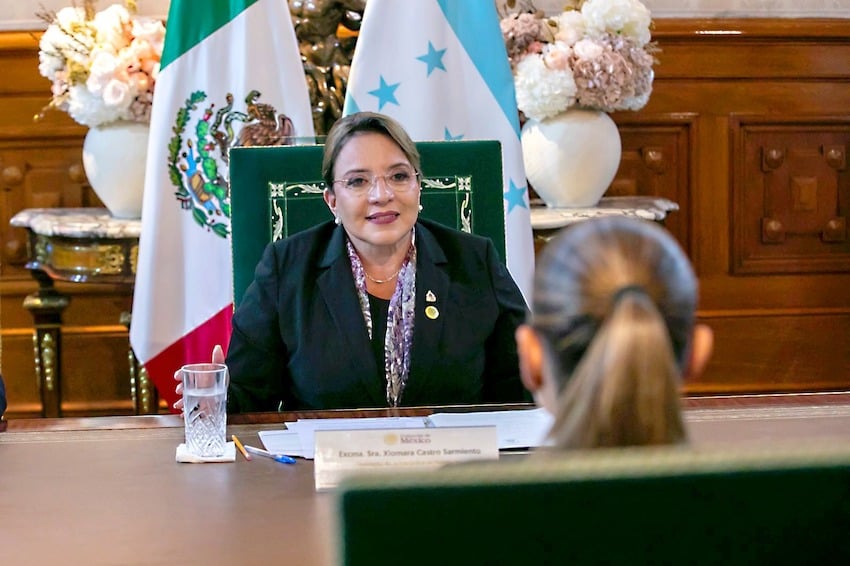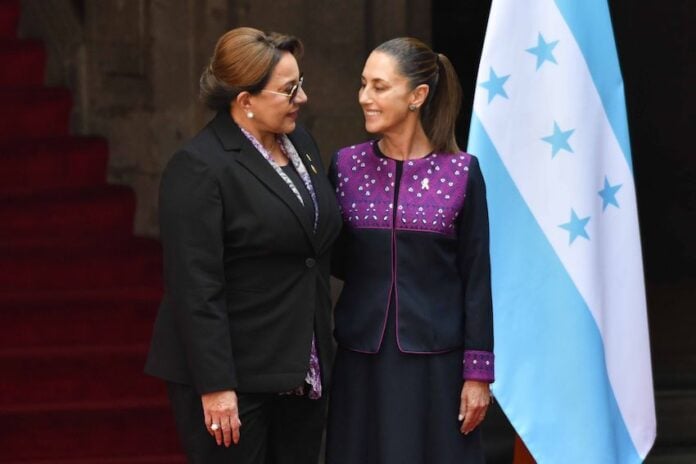The Mexican government’s flagship employment programs will continue to provide work and training opportunities to people in Honduras, one of the poorest countries in the Americas.
The commencement of a second stage of the extension of the Sowing Life reforestation program and the Youths Building the Future apprenticeship scheme to the Central American country was the most significant news out of a meeting in Mexico City on Tuesday between President Claudia Sheinbaum and President Xiomara Castro of Honduras.
Hoy recibimos en Palacio Nacional a la presidenta de Honduras, @XiomaraCastroZ, quien está por concluir su mandato; reconocemos el trabajo y compromiso con su pueblo. Gracias por la amistad y la buena relación bilateral. pic.twitter.com/uXlLKgsWeL
— Claudia Sheinbaum Pardo (@Claudiashein) November 26, 2025
During their meeting at the National Palace, the two presidents “celebrated the results” of the implementation of the two “social programs” in Honduras, according to a statement issued by Sheinbaum’s office.
“In the first stage, more than 20,000 people benefited,” the statement said.
“In light of this, [Sheinbaum and Castro] announced the launch of the second stage, which will provide more opportunities for job training for young people [in Honduras] and favor sustainable development for agricultural communities.”
The Sowing Life and Youths Building the Future programs were created by the government of former president Andrés Manuel López Obrador, and, starting in 2019, were rolled out in Honduras, Guatemala and El Salvador as part of efforts to provide employment opportunities to citizens of those countries and thus deter migration to the United States via Mexico.
On Tuesday, Sheinbaum and Castro “agreed that cooperation is key to addressing the structural causes of migration and promoting well-being in [people’s] places of origin,” according to the statement from the president’s office.
The United States government supported the Central American rollout of the two employment programs, which pay participants a monthly wage of approximately US $350-$450.
Both Sowing Life and Youths Building the Future were tainted by corruption scandals during López Obrador’s 2018-24 presidency, but Sheinbaum has remained committed to the programs.
In Mexico, the Youths Building the Future scheme constitutes part of the government’s efforts to address the root causes of crime, including poverty and lack of opportunity. In some cases, the program could help steer young people away from joining criminal groups, which are known for recruiting wayward youth.

Castro’s administration is a ‘good government,’ says Sheinbaum
At her Wednesday morning press conference, Sheinbaum said that Castro had expressed gratitude for the support Mexico provided to Honduras during her government, which took office in early 2022.
“[Castro’s administration] is a good government, she reduced extreme poverty and reduced poverty with programs similar to ours,” she said, adding that the minimum wage increased in Honduras during Castro’s presidency and “a lot of social infrastructure projects” were built.
“From my point of view, it has been a good government, and we always respect all the people and governments of Latin America, particularly a progressive government such as that which governs Honduras today,” Sheinbaum said.
Bilateral meeting took place on International Day for the Elimination of Violence against Women
Sheinbaum’s meeting with Castro coincided with the International Day for the Elimination of Violence against Women, which the Mexican government marked with the announcement of an initiative called “16 Days of Activism Against Violence Toward Women.”
According to the statement issued by Sheinbaum’s office on Tuesday, “on this emblematic date, the two Latin American leaders reaffirmed their governments’ commitment to eliminating violence against women, as well as their determination to promote public policies that guarantee women’s full development and substantive equality.”
“Both heads of state confirmed the excellent state of the bilateral relationship and the historic importance of being the first women presidents in their respective nations,” the statement added.
Sheinbaum and Castro, the wife of former Honduran president Manuel Zelaya, are two of three women leaders currently in office in Latin American countries. The other is Rosario Murillo, who is a co-president of Nicaragua along with her husband Daniel Ortega.
Sheinbaum and Castro agree to follow up on outcomes of 2023 Palenque summit
The statement issued by Sheinbaum’s office also said that the Mexican and Honduran presidents “agreed to follow up on the conclusions derived from two initiatives convened by Mexico,” namely a regional migration summit held in Palenque, Chiapas, in October 2023, and a meeting in Mexico City in January on “human mobility along the northern migration corridor.”
At the Palenque summit, the first and most elaborate point of 14 that were agreed to by the 10 countries present was to draw up “an action plan for development … to attend to the structural causes of irregular migration in the region.”
Key takeaways from the Latin American migration summit in Palenque
According to Mexico’s Foreign Affairs Ministry, in Mexico City in January, officials from countries including Mexico, Honduras, Brazil, Colombia, Cuba and Venezuela engaged in dialogue and coordinated actions aimed at:
- Protecting the human rights of migrants and preventing their abuse and mistreatment.
- Managing migration through a humanitarian approach that ensures regular, safe, and orderly movement while supporting migrant integration.
- Strengthening international cooperation to address both the structural and immediate causes of migration and the complete migration cycle — origin, transit, destination, and return.
On Tuesday, Sheinbaum and Castro also spoke about energy cooperation.
The two leaders “highlighted the importance advances in energy cooperation thanks to agreements signed between the government of Honduras and Mexican institutions such as Pemex, the Mexican Petroleum Institute, the Federal Electricity Commission and the National Commission for the Efficient Use of Energy,” said Mexico’s statement.
“They expressed the importance of continuing this collaboration through the exchange of experiences, the development of technical capacities, and the transfer of technology to promote more efficient, modern, and sustainable energy systems,” the statement said.
On social media, Sheinbaum noted that Castro is close to completing her four-year term as president and thanked her for her friendship and the “good bilateral relationship” between Mexico and Honduras.
General elections will be held in Honduras this Sunday, with three main candidates vying to replace Castro as president.
By Mexico News Daily chief staff writer Peter Davies (peter.davies@mexiconewsdaily.com)
